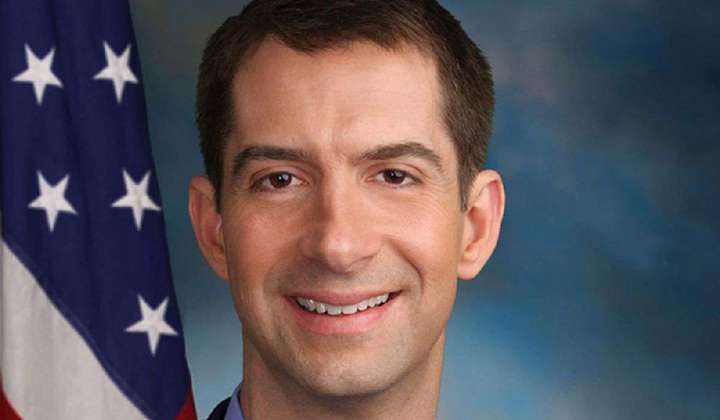Busting the ESG trust

OPINION:
Many of America’s most powerful companies have combined to pursue a dangerous political agenda masquerading as altruism. This agenda, known as Environmental, Social, and Governance (ESG) investing, hurts shareholders, undermines workers, and sabotages American energy independence. It’s also illegal.
Since the passage of the 1890 Sherman Antitrust Act, any “contract,” “combination,” or “conspiracy, in restraint of trade or commerce” has been illegal. Yet, ESG proponents have openly conspired and combined to restrain trade and commerce.
The key to their illegal behavior can be found in the “E” in ESG, which requires firms to shun investment in fossil fuel ventures. ESG-compliant financial firms control over $60 trillion and, while nominally competing, they conspire to constrict the flow of investment into a particular sector of the economy. In so doing, these firms are suppressing competition between one another and restraining the commerce and trade of oil, gas, and coal companies.
The ESG firms participating in Climate Action 100+ are perhaps the most blatant violators of our antitrust laws. Climate Action 100+ is an elite group of the most powerful ESG investors in America, including competitors BlackRock and JP Morgan. This cartel of competing investment firms actively targets less powerful companies and coerces them into lowering their carbon footprint. Adding a new dimension to their criminality, Climate Action 100+ firms often communicate with multiple competing companies at the same time. This may constitute what is called a “spoke and hub conspiracy.” Though President Biden’s FTC Chair and Assistant Attorney General for the Antitrust Division have both acknowledged that these companies may be violating antitrust laws, the Biden administration supports corporate criminals like they support our nation’s drug dealers: through inaction.
Thankfully, Republican state attorneys general have stepped up where Biden stands down. Many have begun investigating ESG companies for antitrust violations and informing the public of the dangers of ESG. Former Arizona Attorney General Mark Brnovich went so far as to say that Climate Action 100+ may be “the biggest antitrust violation in history.” In response to these investigations, some of our nation’s largest law firms, including Latham & Watkins, Baker McKenzie, and Hogan Lovells have begun warning their clients of the antitrust risks posed by the ESG movement. ESG companies should know that Republicans at all levels will investigate these antitrust violations, including when we take back the White House in 2024.
ESG exposes investors not only to legal dangers, but also to significant financial losses. Last year, energy was the only sector in the Standard and Poor’s 500 stock index to rise, yet ESG-aligned funds do not invest in fossil-fuel companies by design. Unsurprisingly, ESG funds underperformed the S&P 500 last year.
Republican states have rightly begun divesting retirement and pension funds from ESG-compliant firms like BlackRock, costing those firms billions of dollars. Inescapably, this divestment will lead to further losses for shareholders in ESG companies. States cannot risk trusting taxpayer dollars to companies exposed to antitrust lawsuits, nor can they allow state-backed retirement and pension funds to be used for woke nonsense that risks the continued health of those funds. It’s up to CEOs to put their shareholders first by ending their affiliation with ESG. Until then, Republicans can, will, and should continue divesting from these firms.
Finally, EGS is simply bad for working Americans. Underperforming ESG-compliant companies and under-invested fossil fuel companies alike are forced to lay off workers or scale back planned hiring because of ESG. Similarly, companies are forced to slow or freeze wage increases, hurting employed workers.
The ESG crusade is also raising the price of energy for all Americans. Partly as a result of ESG mandates, the United States now produces 600,000 fewer barrels of oil per day than at our pre-pandemic peak, despite rising demand and oil prices hovering near historical highs. We should be enjoying an American energy renaissance, but instead we are still struggling to recovering from economic losses inflicted by the pandemic and inflationary pressures inflicted by Joe Biden and the Democrats. ESG is making recovery much harder.
Adam Smith once wrote that “people of the same trade seldom meet together, even for merriment and diversion, but the conversation ends in a conspiracy against the publick, or in some contrivance.” This is certainly true of ESG investors. It’s the responsibility of lawmakers to protect their constituents. The federal government must fully enforce our nation’s antitrust laws and make it clear to companies and investors that they are at risk of major losses if they sign up for the ESG agenda.
Investors beware.
• Senator Tom Cotton, Arkansas Republican, serves on the Judiciary Committee as the Ranking Member for the Subcommittee on Criminal Justice and Counterterrorism, the Intelligence Committee, and the Armed Services Committee, where he serves as the Ranking Member of the Air Land Power Subcommittee. A graduate of Harvard Law School and former clerk with the U.S. Court of Appeals, he left the law to serve in the United States Army as an Infantry Officer on two combat tours in Iraq and Afghanistan. His military decorations include the Bronze Star Medal, Combat Infantry Badge, and Ranger Tab.






